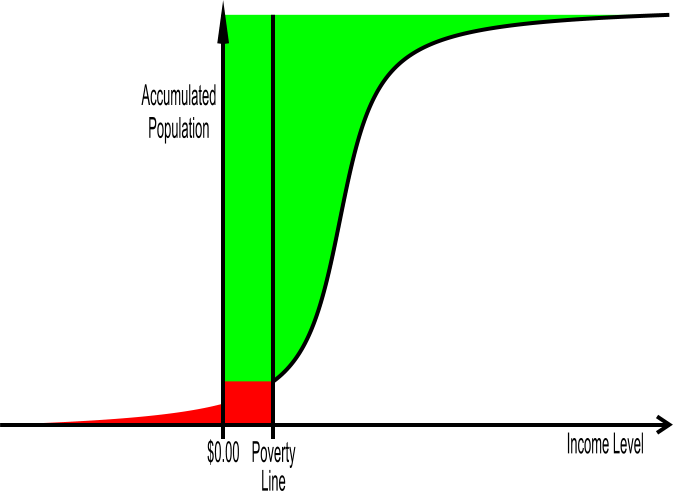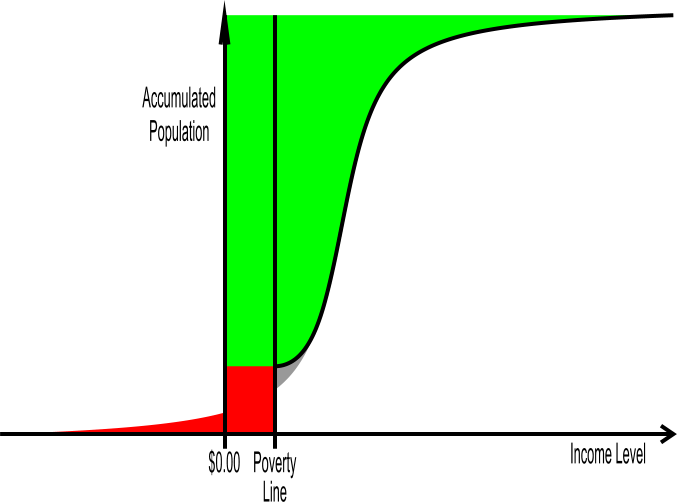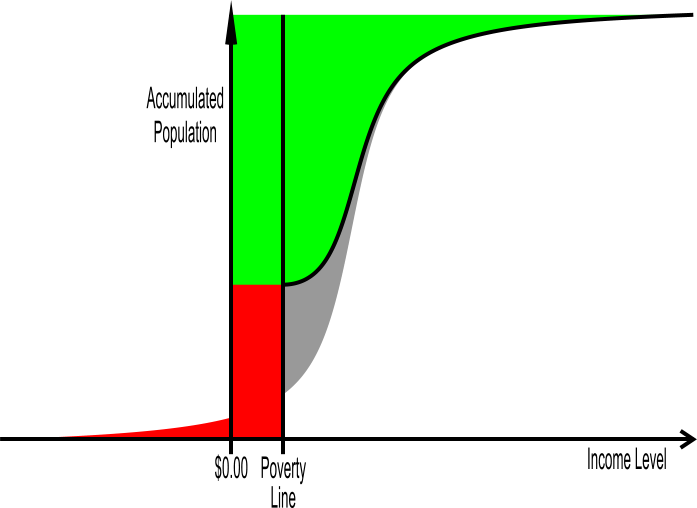The Challenge of Charity
We have several problems that complicate the picture. The first is determining who is below the poverty line. Even if we use a simple income based model, we still need to be able to track everyone's income. This requires a huge amount of surveillance and bureaucracy! Or, we could limit our surveillance to those who apply for help and/or have them sign oaths declaring their poverty. Neither process is pleasant.
But monetary income does not complete the picture. Marriage makes a difference; two people living together can live more cheaply than two living separately. Where you live makes a difference. In a tropical paradise, you don't need much in the way of shelter and clothing. In a harsh climate more is needed. In dispersed communities, sanitation and medicine is less necessary. In urban communities sanitation is a life or death matter. Plumbing is not free.
But let us ignore those problems and stick to our simple income model. We still have a huge problem: the poverty program equivalent of the Laffer Curve. If we give people money to just make up the difference between what they make and the poverty line, there is zero incentive to work if that work produces less than the poverty line. The result is as follows:

The S curve starts at the poverty line since no one bothers to work unless they can do better than the poverty line. Our poverty program has grown more expensive, but it is still manageable.
But we have underestimated the problem yet! Leisure time is valuable. Suppose the poverty line is $9000 and you can make $10000. Do you work? Is it worth working all year to make an extra $1,000? This benefit, based on proving poverty, has the same demotivating effect as an 90% income tax. Many people who were above the poverty line will drop down to the poverty because leisure time is valuable.

We have increased the number of borderline poor people, and this is just in a static view. Income is based heavily on previous income. Experience and reputation accumulate as you work. Today's poor worker becomes tomorrow's not so poor worker, or even tomorrow's tycoon. For many, a poverty program that discourages work is a trap. (An exception would be those who use the leisure time to improve on their education.) Our attempts to reduce poverty increase the number of poor over time! And our welfare budget has gone up!

As the welfare budget goes up, taxes go up. Some of those taxes are bound to hit the working class. There are but just so many CEOs and rock stars out there to tax, and they can afford very good accountants and lawyers. This reduces the income of the middle class, and pulls some down to the point where joining those on the dole looks inviting.
Now suppose we drop our simple income based definition of poverty and include some lifestyle factors. In particular, let us consider marital status. A poor single mother with child has more needs than a single healthy adult. So the obvious thing to do is to give out more aid to single mothers – Aid to Families With Dependent Children. The unfortunate side-effect: some poor people getting divorced or not getting married in order to qualify for more dole money. We also have some teenagers getting pregnant in order to qualify. Once again, we have increased poverty through our generosity.
Keep in mind that the program described will help out the truly needy. It just has some unpleasant side effects and is more expensive than advertised.
One more thing: what do people do with all this leisure time? Take lots of drugs is one answer. The price (in lost productivity) of taking drugs and alcohol is less if you don't have to work. This is also why teenagers and college students are notorious for drugs and alcohol. It is not the poverty that causes the abuse; it is the leisure time. Let me state for the record that I did plenty of heavy drinking myself during my college days--I had time to do so. Yet another option is crime. If you lose money for working legally, then illegal work is the quickest way to increase your income. “Crime” includes both real crimes like robbery, and victimless crimes like selling marijuana.
In summary: if people have to prove their poverty in order to receive benefits, then it pays to act poor.
A corollary: a good anti-poverty program is one that doesn't rely too much on proof of poverty.
There are several options for doing this, some better than others.


